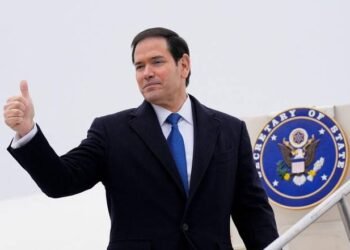Sir Keir Starmer’s government has threatened to hit the US with retaliatory tariffs if the UK cannot strike a trade deal with Donald Trump.
Business secretary Jonathan Reynolds said ministers will look at “possible retaliatory action” in response to 10 per cent levies on British goods entering the US, as officials work through 417 pages of products they could target.
The list, which is said to “demonstrate what products may be subject to any future UK tariff response”, includes key US products such as motorcycles, guitars and jeans but also scores of other items, ranging from whale meat to chopsticks.
It comes as the prime minister was unable to rule out another tax raid or more cuts to benefits in a bid to balance the government books.
The Office for Budget Responsibility (OBR) had already warned that the Trump tariffs would wipe out the fiscal headroom chancellor Rachel Reeves clawed back with her spring statement last week.
As businesses began to assess the economic turmoil unleashed by the US president, the Federation of Small Businesses (FSB) revealed that around a third (32 per cent) of small and medium-sized firms have been hit by the tariffs.
Meanwhile, international markets were in turmoil, led by the Dow Jones losing more than 1,500 points on the day’s trading. The US dollar hit its lowest point for six months as the EU warned that Trump had struck “a major blow” against the world economy.
With a full-blown trade war looming, Ursula von der Leyen, president of the European Commission, said on Thursday the bloc was “prepared to respond” to Trump’s tariffs, while French president Emmanuel Macron condemned them as “brutal”.
The UK prime minister again appealed for calm but acknowledged at the launch of his local government campaign in Chesterfield that the world is at the beginning of a “new economic era”.
Start of a ‘new era’
Sir Keir said “we have to act and lead differently”, describing the response to President Trump’s tariffs as “not just a short-term tactical exercise”.
“It is the beginning of a new era, we need to understand that, just as we have for defence and security, we have to understand the changing world when it comes to trade and the economy,” he added.
Economists and businesses warned of a “seismic change” to world trade since Trump unleashed his tariffs on Wednesday night.
Seismic change
Emily Fry, senior economist at the Resolution Foundation, said: “The newly announced tariffs represent a seismic change in trade policy, taking US tariffs back to rates not seen since the early 20th century and generating significant volatility in the financial markets.”
Already there had been warnings of 25,000 job losses in the motor industry in the UK, due to 25 per cent tariffs on automobiles and parts, but other sectors were also counting the cost.
Reynolds, who set a deadline of early May for the consultation, also told the House any action would be “paused” if a trade deal was struck.
No 10 denied the month-long exercise meant they were dithering, while Sir Keir brushed off suggestions he should “jump straight into a trade war” with the US, describing this as “a really important moment”.
“That is why we are sensibly doing what is necessary,” Sir Keir said.
Earlier, Reynolds insisted “America is a friend” despite the tariffs, due to come into force this weekend.
Hours after the US president ushered in a new era for global trade and accused foreign countries of “ripping off” America, he said he was “disappointed” by the levies, but insisted: “America is a friend, America is our principal ally.
“Our relationship is an incredibly strong economic one, but also a security one and a political one as well.”
The Independent









 United Arab Emirates Dirham Exchange Rate
United Arab Emirates Dirham Exchange Rate

